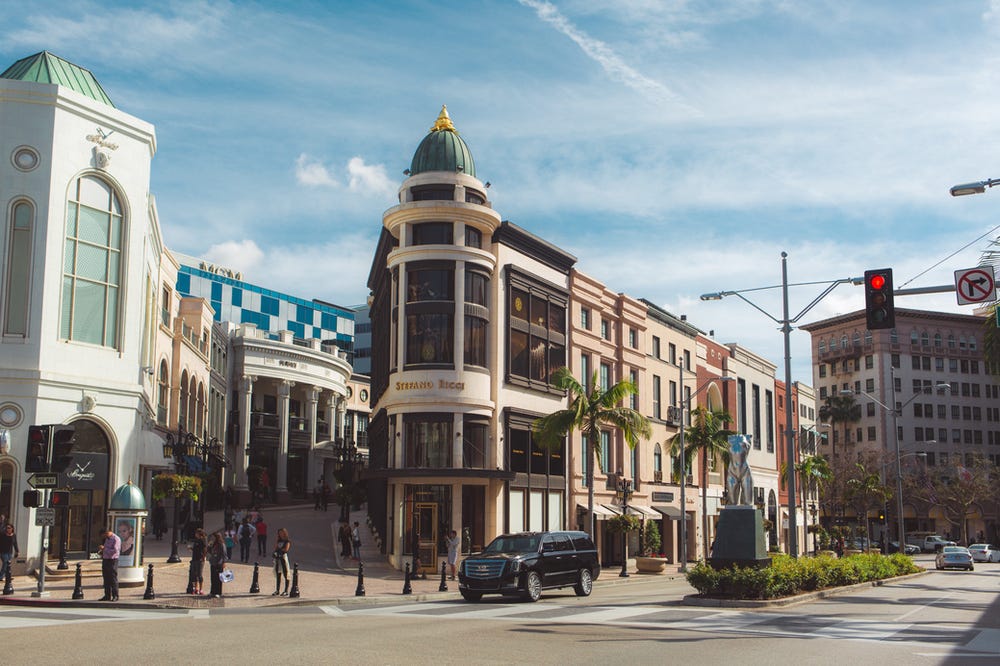Does LVMH own Rodeo Drive?
LVMH has purchased over $700M of commercial property in Beverly Hills, CA
The luxury retail industry has been evolving over the past decade. The COVID-19 pandemic has only accentuated the need to be agile to quickly adapt to the external business environment. It's no longer just about having a physical store; luxury brands are using technology to sell their products and services online as well as offline. New luxury retail stores, pop-up shops and now LVMH buying commercial property on Rodeo Drive is changing the luxury retail landscape for good.
LVMH, the luxury goods conglomerate, has been on a buying spree as of late. In addition to purchasing Christian Dior for $13 billion in June 2017, LVMH also bought commercial property on Rodeo Drive. This move signals that LVMH is bullish on the luxury retail industry and sees tremendous potential in this space.
LVMH owns approx. 84,000 square feet on Rodeo Drive
In 2018, LVMH paid $245 million for the former Brooks Brothers retail site on Rodeo Drive (turned it into the #LouisVuittonX Exhibition for Summer 2019). Also that year, the company acquired the Paley Center museum at 465 N Beverly Drive for $80 million, which is directly adjacent to 468 N Rodeo. The new Cheval Blanc hotel, which is controlled by LVMH, will take up these adjacent lots on the corners of little Santa Monica and Beverly Drive, as well as little Santa Monica and Rodeo Drive. The upcoming hotel is expected to begin operations in 2025 and will be their first in the United States. The hotel will feature approximately 50,000 square feet of combined real estate and include over 100 guestrooms as well as ground-floor LVMH retail boutiques and dining options.1
According to The Real Deal, the Beverly Hills-based hotelier Efrem Harkham recently sold his Rodeo Drive property, which housed his Luxe boutique hotel and remains home to three high-end retail shops (Patek Philippe + Rolex and Ferrari), for $200 million to LVMH.2
In total, LVMH has invested around $750 million on commercial property in Beverly Hills.
Other owned retail space:
319-323 N. Rodeo Drive for $85M, Dior Homme currently occupies 319, and 323 is vacant - purchased in 2012
420 N Rodeo Drive for $122M, currently vacant, former home to the iconic Bijan store - purchased 2016
456 N. Rodeo Drive for $110M is presently occupied by CELINE - purchased in 2018
LVMH's strategy is limited only by imagination. The city of Beverly Hills city council has been at odds with luxury retailers and hotels about being able to build taller buildings on parcels that have existing development rights allocated through a zone change ordinance.
This luxury conglomerate is aggressively investing in the luxury retail landscape to stay ahead of other luxury brands. However, only luxury brands well-positioned are remodeling and expanding their retail footprint. For example, Gucci has recently announced plans to double its store count by 2022/23 with 45 stores planned for Asia alone.
The Luxury Retail industry is changing
The retail industry is changing quickly and it’s no longer about being either an online retailer or a physical one. Retailers are now omnichannel, meaning they have the ability to sell products both in-store and online with equal ease. Successful retailers will be able to shift their focus from just eCommerce sales to all channels of commerce including digital marketing, social media advertising, mobile applications, etc.
It has become important for luxury companies like LVMH that own many luxury labels such as Louis Vuitton and Christian Dior among others - which traditionally rely on high-end stores for much of their revenue – to invest in commercial real estate so they can secure space for future growth instead of renting as needed when demand changes unexpectedly.
What do you think the purpose of a retail store is and how will it change in the future?
https://beverlyhillscourier.com
https://therealdeal.com




